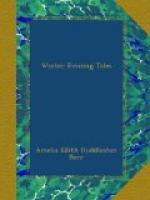At length he determined to go and see David before he decided upon the course he ought to take. The sheriff’s was only about three miles distant. He rode over there at once. His son, with travel-stained clothes and blood-shot hopeless eyes, looked up to see him enter. His heart was full of a great love, but it was wronged, even at that hour, by an irritation that would first and foremost assert itself. Instead of saying, “My dear, dear lad!” the lament which was in his heart, he said, “So this is the end of it, David?”
“Yes. It is the end.”
“You ought not to have run away.”
“No. I ought to have let you surrender me to justice; that would have put you all right.”
“I wasna thinking o’ that. A man flying from justice is condemned by the act.”
“It would have made no matter. There is only one verdict and one end possible.”
“Have you then confessed the murder?”
He awaited the answer in an agony. It came with a terrible distinctness. “Whaley lived thirty hours. He told. His brother-in-law has gone on with the cattle. Four of the drivers are come back as witnesses. They are in the house.”
“But you have not yourself confessed?”
“Yes. I told Sheriff Gillelands I shot the man. If I had not done so you would; I knew that. I have at least spared you the pain and shame of denouncing your own son!”
“Oh, David, David! I would not. My dear lad, I would not! I would hae gane to the end o’ the world first. Why didna you trust me?”
“How could I, father?”
He let the words drop wearily, and covered his face with his hands. After a pause, he said, “Poor Lulu! Don’t tell her if you can help it, until—all is over. How glad I am this day that my mother is dead!”
The wretched father could endure the scene no longer. He went into the outer room to find out what hope of escape remained for his son. The sheriff was full of pity, and entered readily into a discussion of David’s chances. But he was obliged to point out that they were extremely small. The jury and the judge were all alike cattle men; their sympathies were positively against everything likely to weaken the discipline necessary in carrying large herds of cattle safely across the continent. In the moment of extremest danger, David had not only refused assistance, but had shot his employer.
“He called him a coward, and you’ll admit that’s a vera aggravating name.”
The sheriff readily admitted that under any ordinary circumstances in Texas that epithet would justify a murder; “but,” he added, “most any Texan would say he was a coward to stand still and see eight thousand head of cattle on the stampede. You’ll excuse me, Lorimer, I’d say so myself.”
He went home again and shut himself in his room to think. But after many hours, he was just as far as ever from any coherent decision. Justice! Justice! Justice! The whole current of his spiritual and mental constitution ran that road. Blood for blood; a life for a life; it was meet and right, and he acknowledged it with bleeding heart and streaming eyes. But, clear and distinct above the tumult of this current, he heard something which made him cry out with an equally unhappy father of old, “Oh, Absalom! My son, my son Absalom!”




